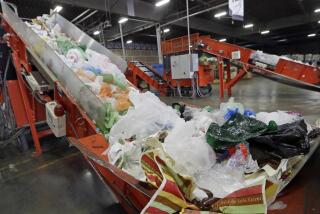Newport Beach and Costa Mesa seek to discourage trash scavengers
- Share via
In one city, officials want to lock them up. In another, they want to lock them out.
Responding to complaints from residents who say they’re fed up with trash scavengers, Newport Beach officials voted recently to criminalize the practice; in Costa Mesa, officials are considering a plan to keep garbage under lock and key.
The actions, officials say, are intended to thwart a growing number of curbside collectors who cruise neighborhoods in search of recyclables and other discarded items. Residents and police say they’re not targeting victims of a bad economy — most scavengers are out of work or underemployed — they say they’re combating crime. The scavengers, they say, are also snatching bicycles and other valuables.
“It’s a way to hopefully deter scavenging and also give residents a sense of comfort,” said Scott Carroll, general manager of the Costa Mesa Sanitary District. “But I don’t believe you’re ever going to have zero scavenging.”
Carroll and the city’s waste hauler, CR&R, are developing a program to distribute lockable trash cans to those who request them. Residents would keep a key to lock the cans on collection day. The pull of gravity would open the lids once an automatic arm lifted the bin over the tops of garbage trucks.
Newport Beach is taking a strict enforcement approach, police officials have said, because scavengers sometimes steal bikes and other property from residents’ garages and have been caught collecting information that could be used to steal someone’s identity. Until recently, police could ticket people only for rummaging in trash. Now, they can arrest them.
At a meeting Tuesday during which the City Council approved the ordinance, Lt. Rob Morton told the panel that residents routinely complained about scavengers.
“For some people it really provokes a visceral reaction, and they don’t like it,” Morton said.
West Newport resident Cynthia Kohler said she was not pleased that scavengers pass through her neighborhood every day. “They come up to our doors, they come onto our patios,” she said.
Mike Carey, director of the Orange Coast College Recycling Center in Costa Mesa, said the laws would definitely affect the scavengers’ livelihoods.
He discounted one of the officials’ reasons for the changes: that the scavengers are stealing from the cities, which earn money from recycled goods.
“It’s not to create or maintain revenue for the city or the waste hauler,” he said. “It’s to keep people out of the trash.”
Newport Beach Mayor Mike Henn said he understood that this issue may not be the Police Department’s most pressing, but he asked police to make it a bigger priority “and by a way of announcing our new ordinance, make some arrests.”
He also suggested impounding some scavengers’ vehicles.
Santa Ana instituted a successful locked-can program in 2009, according to Carroll. He said the ruckus they would cause and the weight of the cans would discourage scavengers from turning them over to rummage through them.
“They try to get in and get out as quickly as possible,” he said.
More to Read
Sign up for Essential California
The most important California stories and recommendations in your inbox every morning.
You may occasionally receive promotional content from the Los Angeles Times.













